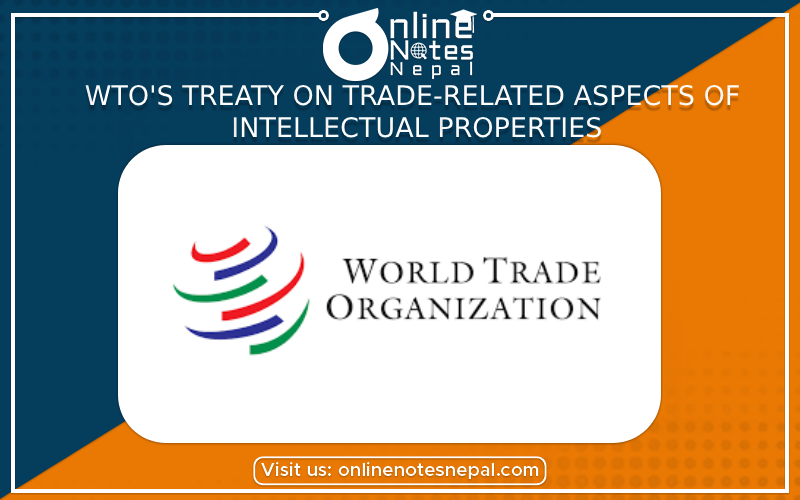Published by: Anu Poudeli
Published date: 08 Aug 2023

The Treaty on Trade-Related Aspects of Intellectual Property Rights (TRIPS) of the World Trade Organization (WTO) is an international agreement that specifies minimum requirements for the protection of various forms of intellectual property (IP) within the scope of international trade. It was agreed during the Uruguay Round of international trade talks and went into effect on January 1, 1995, simultaneously with the foundation of the World Trade Organization.
The TRIPS Agreement seeks to find a balance between encouraging innovation and maintaining public access to knowledge and technology. It includes patents, copyrights, trademarks, trade secrets, and industrial designs among other intellectual property rights. The following are some significant elements of the TRIPS Agreement:
1.Minimum Standards : TRIPS establishes minimal criteria for intellectual property protection that WTO member countries must implement. These standards address the length of protection, the breadth of protection, and the means for enforcing protection.
2.Patent : TRIPS requires member nations to grant patent protection to inventions in all disciplines of technology that are new, creative, and capable of industrial application. The minimum period for a patent is 20 years.
3.Copyrights : TRIPS requires the protection of literary and artistic works, as well as computer programs and databases. The minimum period of copyright protection is the author's life plus 50 years.
4.Trademarks : TRIPS establishes requirements for trademark protection, including well-known marks, and gives principles for combating unfair competition.
5.Geographical Indications: The agreement includes provisions to safeguard geographical indications, which designate commodities as being from a specific locality and having traits, reputation, or characteristics associated with that location.
6.Enforcement : TRIPS emphasizes the importance of efficient intellectual property enforcement. It necessitates the establishment of legal processes and remedies for upholding these rights, like as injunctions, damages, and penalties, by member countries.
7.Technology Transfer : TRIPS facilitates the transfer of technology between developed and poor countries. Developed countries are encouraged to provide technical assistance and support to developing countries in order to assist them in developing their own technological capabilities.
8.Flexibilities and Exceptions : TRIPS contains significant flexibilities that allow member countries to take actions to preserve public health, increase access to vital medicines, and address other societal needs. These adaptabilities are especially important.
9.Doha Declaration : The Doha Declaration on TRIPS and Public Health, issued in 2001, supported member nations' responsibility to defend public health and promote universal access to medicines, particularly in cases of health emergencies such as HIV/AIDS, tuberculosis, and malaria.
10.Dispute Settlement: The World Trade Organization's dispute settlement mechanism allows member countries to raise TRIPS violations and seek remedies through a structured process.
The TRIPS Agreement has received both praise and criticism. While it has helped to global intellectual property protection and innovation, concerns have been expressed regarding its potential to obstruct access to important medications and knowledge transfer, particularly in developing nations. Attempts have been made to find a balance between intellectual property protection and public policy.